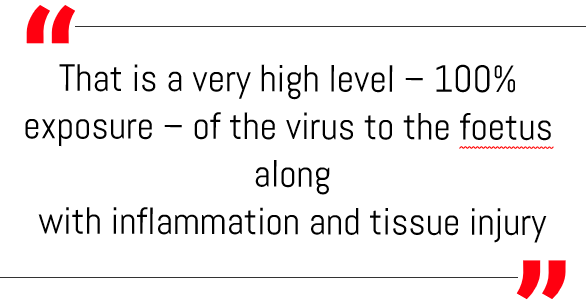
Research has shown that there may be a link between the Zika virus and a number of neurological disorders including the known Guillian-Barré syndrome and microcephaly. It could result in brain damage, disability, weakness, paralysis and could impact long-term memory. It could also lead to depression in some.
New research shows abnormalities in the eyes – which, as part of the central nervous system, underdevelop in the foetus during pregnancy.
Infection makes its way to the foetus
Scientists exploring how the Zika virus passes from pregnant monkeys to their foetuses believe the infection may be more dangerous to human pregnancies than previously believed.
The study appears in PLOS Pathogens.
"The results we're seeing in monkey pregnancies make us think that, as they grow, more human babies might develop Zika-related disease pathology than is currently appreciated," said lead researcher Ted Golos.
Golos is professor of comparative biosciences and obstetrics and gynaecology at the University of Wisconsin-Madison.
The foetus is in danger
The researchers came to their conclusions after infecting four pregnant macaque monkeys with levels of the virus roughly equivalent to what they'd get from a mosquito bite. Some monkeys were infected in the first trimester and others in the third trimester of the pregnancies.
The scientists found that the virus made its way to each monkey's foetus.
"That is a very high level – 100% exposure – of the virus to the foetus along with inflammation and tissue injury in an animal model that mirrors the infection in human pregnancies quite closely," Golos said in a university news release.
Three monkey foetuses had small heads, but not small enough to be diagnosed with microcephaly – the most dramatic result of Zika infection in human newborns.
Optic nerve disorder
But, while the monkey foetuses didn't show signs of abnormal brain development, the researchers discovered unusual inflammation in the eyes, retinas and optic nerves of those infected during the first trimester of pregnancy.
"Our eyes are basically part of our central nervous system. The optic nerve grows right out from the foetal brain during pregnancy," said study co-author Kathleen Antony, a professor of maternal foetal medicine at UW-Madison.
Caution advised in humans
"It makes some sense to see this damage in the monkeys and in human pregnancy problems such as chorioretinal atrophy or microphthalmia in which the whole eye or parts of the eye just don't grow to the expected size," she added.
The researchers said studying Zika infection in monkeys is a way to follow progression of the mosquito-transmitted infection in people.
And although animal studies often don't yield the same results in humans they are the closest non-human primates to provide successful results.
Read more:
Doctors urged to check pregnant women for Zika
Scientists analyse risk to pregnant women infected with Zika




 Publications
Publications
 Partners
Partners
















